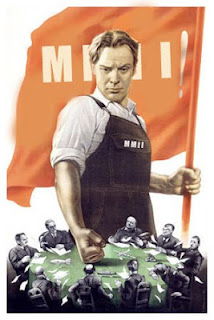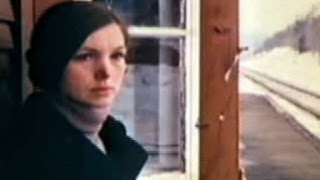The Burning City: An Interview with Brian Diemar of MMII
 |
| MMII propaganda poster (source) |
Except that he had been making and producing music the entire time. And his major collaborator is Brian Diemar. Brian is a veteran lead guitar player and producer. Just prior to meeting Pogo he had left the band AM Conspiracy, a group he had formed with Jason Jones, the former lead singer of Drowning Pool. Pogo and Brian first collaborated by producing other bands under the name Faultline Productions. Shortly afterward, they began their collaboration with Hoss, a drummer who had played with the Exies and Mondo Generator. Together, the trio are MMII (pronounced “em em eye eye”). They also have several side projects where they work with other musicians and experiment with different styles. The first two side projects are “and then...” and Life in Exile. All three groups have demos available on their Facebook pages. Albums from all three projects are going to be released this fall.
Early this year, Diemar moved from LA to Mobile, Alabama, buying a seven and a half acre farm. The farm not only serves as a domicile but also as the headquarters for Burning City Frontiers, a studio and record label that will not only release the debut MMII album and side projects, but will also put out several other musical groups. Not content to limit the label to industrial or electronic influenced bands, they will be releasing everything from rock to country to gospel groups, in short, anything they think is good. Burning City is partnered with THC: Music and Rocket Science Ventures, two excellent indie labels that are distributed by RED Sony. When Burning City Frontiers launches this fall, we could be looking at one of the most exciting indie music movements to come along in quite a while. If nothing else, it will certainly be one of the most unique.
So how are things down where you are?
Diemar: We love it here.
Yeah, I used to live not too far from there. Birmingham.
Diemar: It’s a little different from LA.
Yeah, yeah, sure.
Diemar: But, you know, Pogo’s from Florida, my family’s from here, so, we’re used to it.
So you’re from Alabama?
Diemar: I’m from Chicago but my family’s been down here for a long time.
Pogo’s in Florida right now?
Diemar: Yeah, that’s where he’s from. The Ft Lauderdale area.
Is he gonna come to the studio to do the vocals?
Diemar: Yeah, yeah. When we’re ready to finish he’ll be coming out here. Same thing with Hoss.
Do you know when that’ll be?
Diemar: Probably the next three or four weeks.
Oh, wow, so pretty soon.
Diemar: Yeah, we’ve got the label launch in the fall, so we have to prepare. We’ve got one of the side projects done, another one getting done, then the MMII stuff will be done. Then we have at least three bands we’re releasing.
And then that’s gonna all be out when the label launches?
Diemar: Yeah.
Wow.
Diemar: Yeah, we’re gonna drop a bomb and see what happens.
So you’ve got a lot of work to do!
Diemar: Yeah, well, you know, this whole business thing is new territory for us. I’m used to having everything taken care of.
When did you and Pogo meet each other?
Diemar: We’ve been friends for a long time. We were introduced through a mutual friend who was a tech for me and who was also Pogo’s tech for many years. And he was like, “You guys need to meet.” We became really good friends. And when he left Manson we started working together.
Was it right after he left the band?
 |
| One of many mysterious MMII logos (source) |
That was in 2007?
Diemar: Yeah. So, yeah, about 2008. It was about a year or so. We were just hanging around, listening to music all the time. And then I had my other band, AM Conspiracy, which was with Jason Jones, who was the lead singer of Drowning Pool. And I wanted to bring Pogo into it. So we were gonna do that but decided to let go of that band.
You were on the first EP and that was it, right?
Diemar: I did all the music for the entire album. We didn’t really put out an entire EP. A lot of crap went on, with label stuff. I did all the music and Jason did all the lyrics. AM Conspiracy bascially was me and him.
Was it after you left AM Conspiracy that you started Faultline Productions?
Diemar: Yeah, we threw that together. We started producing some bands, working on our own stuff. And we got along so great we said, “Maybe we outta keep doing this for real.”
Was it just a sort of informal thing?
Diemar: It was kind of informal.
But it wasn’t a business or anything?
Diemar: No, we wanted to. Yeah, we had these grand ideas but we were still feeling out the waters. He was still in the middle of the whole Manson suit. And being burned as bad as he was burned, and you know, I had just come out of the AM Conspiracy thing and I felt like I needed to feel everything out too. But the one thing we both have in common is that we’re brutally honest and fair. So it works out great.
Yeah, I definitely noticed that about Pogo’s Facebook page!
Diemar: He’s honest to a fault. He tells it like it its. He’s kind, he’s fair, but sometimes people mistake his honesty for being mean (laughs). He’s also so damn smart. His intelligence is far above mine, anyone else I know.
When did Hoss come into this?
Diemar: Probably about a year after me and Pogo were working together. He was playing with Mondo Generator. We were introduced to him. He’s one of the best drummers we’ve ever played with. I mean, I don’t know if you listen to Mondo’s stuff, but it’s just heavy, heavy, punk rock.
Are all the drum tracks [on the demos streaming on the fan page] going to be replaced with live drums?
Diemar: Most likely, yes. And when Hoss does take one of our tracks, he makes it his own and takes it to a whole nother level.
So, basically the demos that are up for MMII is just a small taste of what we’re gonna get?
Diemar: Yeah, absolutely.
So you’ve got this studio now and you’ve got a label that you’re gonna release all this stuff on, Burning City Frontiers.
Diemar: Yeah, and we go through THC: Music/Rocket Science Ventures, which is a RED Sony label.
Cool. So there’s going to be some good distribution for these albums.
Diemar: I hope so, yeah! I mean, we’re doing everything from rock to electronica to metal. We’re doing country and gospel, blues. We don’t believe in genres. I mean good music is good music, whatever it is.
Do you think having all these different genres is going to cause a branding issue?
Diemar: I don’t think so. What we want to be known for is putting out good music, whatever the genre. I would hate to be pigeonholed into, you know, “All they put out is Industrial music” or “All they put out is Metal music.” We listen to so many different things.
I don’t think people are too interested in one genre anymore.
Diemar: Good music is good music, whatever. You could listen to a country record and then put on a metal record. There are no rules. And the way the music business is these days, there are no more rules at all.
Do you use the phrase “Cooperation over Competition over Corporation for the People” as a sort of [ethical] guide?
Diemar: We live it. Pogo came up with that. And if you’ll notice, if you capitalize the first letter of each word, what they spell out (laughs).
Yeah, I see that!
Diemar: So, we’re a collective, basically. We’re artists running a label that’s artist driven. And everything we do is fair and equal.
How does that work out in day to day practical sorts of ways?
Diemar: We’d like to make a buck, but not at the expense of the artist. Bottom line is the artist. We’re not taking their publishing, we’re not taking their merchandising.....So, basically we’re putting out a product, taking a percentage of that. We’re not gonna own the record. We’re just licencing it for the cycle of the record. Once it’s over, the rights revert back to the artists.
Wow, that is pretty radical.
Diemar: Yeah, and we’re not signing multiple deals, either. And we can do singles, EPs, full CDs, whatever. We can do whatever we want.
Is one of the reasons you moved from LA to Mobile that it would save you on costs for this ambitious project?
Diemar: I kind of got sick of LA, you know, I had been there so long. And, yeah, the cost of living here is awesome (laughs).
Do you start a new band when you want to explore new musical styles?
Diemar: No, with me and Pogo, with MMII, there’s four or five different styles. There’s some heavy things that are Manson, Nails influenced stuff. The first track we did was more of a modern take on Delta blues, then we have more Melvins type heavy stuff. Grinding. And we have some total electronic stuff. Some old-school industrial kind of electronica. And then we have a track that’s more folky-electronic. So, just kinda jumpin’ genres. It’s all kinda cohesive. It’s all us, the same musicians, the same electronic, heavy, industrial, dark stuff. So it’s all cohesive. And, a lot of cool different guests. Some cool 80’s people on it. Some of Pogo’s friends. Special guest people that I think people will be very excited about. I know we are.
Cool. Yeah, I’m really excited about all this too.
Diemar: Yeah, you know with the whole lawsuit and all this crap, for years, Pogo couldn’t do anything. He was basically on a gag order.
Well, I wish you luck, man.
Diemar: Appreciate it.


Comments